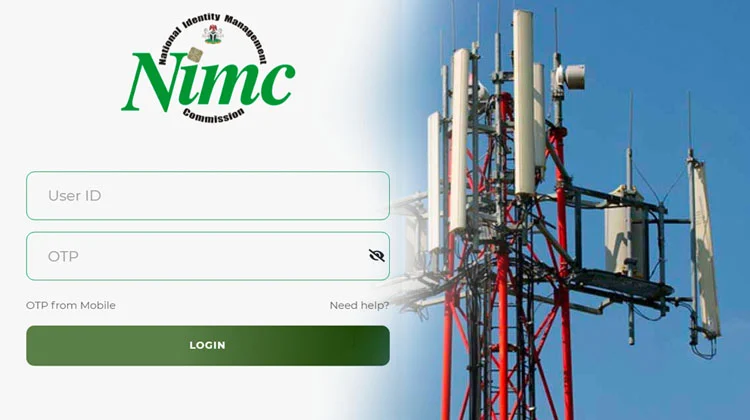Business
SIM-NIN: 22 Days After Ban, Telcos Lose N76bn, Subscribers Stranded
Published
2 years agoon
By
Editor
Telecommunication companies have lost about N75.78bn as subscribers struggle to link their National Identification Number to the Subscriber Identity Module, about 22 days after the Federal Government directed telecom companies to bar defaulting consumers from making outgoing calls.
On April 4, the Federal Government directed telcos to restrict outgoing calls on all lines that had not linked their SIMs to NINs after the deadline for the verification exercise expired on March 31.
As a result, about 72.77 million active telecom subscribers were barred from making calls on their SIMs. Voice revenue is a major source of revenue for telecom companies. In 2021, MTN made N819.74bn from voice revenue, while Airtel made N397.91bn from voice.
According to the Association of Telecommunications Companies of Nigeria, the industry Average Revenue Per User was N1,420 in 2020. This translates to about N1,041.33 per subscriber in 22 days.
READ ALSO: NIN-SIM Link: Buhari Dragged To Court Over Blocked Lines
According to the statement announcing the directive, subscribers whose lines are restricted can have them unrestricted once they link their SIMs to their NINs.
Meanwhile, sources in the telecom industry have said the process has not been seamless and that it is also impacting telcos’ revenue stream.
A source in the Association of Licensed Telecoms Operators of Nigeria said the verification exercise had become a major challenge for the operators and the Nigeria Identity Management Commission.
The source said, “This ban is significantly impacting on the revenue stream of telcos. If almost half of your subscribers are cut down, that is, they cannot make calls; of course, this will impact revenue.
“From the telcos’ side, we have no challenge. The challenge is with the Nigeria Identity Management Commission, with verification.
READ ALSO: NIN-SIM Linkage: NCC Tells Nigerians Only Way Their Phone Number Can Be Unbarred
“They have a lot of subscribers who want to verify their NINs. And without these verifications, we can’t activate these numbers. A lot of people have tried to link but because they have not been verified, they are still blocked. There are still certain numbers of verifications that can be done per day, and this is technology.
“So in-between those periods there may be downtime, issue of non-access, and more. I cannot tell you offhand how many verifications we can do per day. The major challenge we have now is that of people trying to unblock their numbers. There is a surge, and sometimes they are overwhelmed. That is what is happening presently, but all the stakeholders are trying to do their best.”
A high-ranking source in one of the telecom companies said there was nothing the companies could do as they needed NIMC to give a go-ahead before they could unblock numbers.
The source said, “A lot of the issues we have are from the NIMC end. There is nothing anyone can do. If this problem is from the backend, it means every network subscriber is likely to be facing this challenge.
“One thing is for operators to regularise from their side. Another thing is for the NIMC to do their part. Sometimes it gets to them, and they have downtime and maybe server issues.”
According to the source, when subscribers submit their NIN for verification, it gets sent to the NIMC, which has to send feedback before the numbers can be unbarred. The source added, “So, after telcos accept the numbers and verify, we need to wait for feedback from the NIMC, this is where there is a problem.”
The President of the National Association of Telecoms Subscribers, Adeolu Ogunbanjo, stated that the capacity for NIMC to accept uploads was not particularly adequate. He added that congestion in the past couple of days had aggravated the situation.
READ ALSO: NIN-SIM: SERAP Tackles FG Over Planned Blocking Of 72 Million Telephone Lines
He said, “Subscribers are trying to link their lines, but they are still being barred. The capacity of the NIMC to accept the upload is not particularly adequate. Now, there are so many people who want to upload all their data so that the NIMC will verify.
“That is not happening because there is so much congestion right now. And unfortunately, the relevant ministry does not want to listen. They are still saying, through the NCC, that they are not going to extend it anymore. This is why we would be joining SERAP by end of this month in its suit against the government.”
Ogunbanjo further said that subscribers were paying as much as N10,000 to get their numbers verified within three to four days at NIMC centres.
He stated, “It is a problem. Go to the NIMC centres, it is a mess. Again, if your NIN and Number are verified within three to four days, you would have to pay N10,000. People are paying because they are frustrated.
“We are still appealing to the agencies to give at least another three-month extension. Let them unbar subscribers so that sanity can be restored to the centres. Another 90 days won’t make any difference, it would only give us time to regularise.”
Efforts to reach the Head, Corporate Communications at the Nigeria Identity Management Commission, Mr Kayode Adegoke, proved abortive.
Calls and WhatApp messages sent to him were not responded to as of the time of filing this report.
PUNCH
You may like

Chairman of Dangote Industries Limited, Aliko Dangote has said that the devaluation of Naira created the biggest mess for the company in 2023.
Speaking at the annual general meeting of Dangote Sugar Refinery, Dangote said this affected lots of companies in the country.
He said: “We are doing whatever it takes to make sure that at the end of the day, we will be paying dividends because if you look at our dividends last year, it was almost 50 percent more so we will try and get out of the mess.
READ ALSO: Ex-policeman Who filmed Wife Having Wex With Her Superior Found Guilty Of Stalking
“The biggest mess created was actually the devaluation of the naira from N460 to N1,400. You can see almost 97 percent of the companies, especially in food and beverages businesses, none of them will pay dividends this year for sure but, we will try and get out of it as soon as possible.
“We want to see that at the end of the day, no matter how small, we will be able to pay some dividends, especially if there is a rebound of the naira.”
Business
Customers Panic As CBN Bans Opay, Palmpay, Others’ New Accounts
Published
2 days agoon
April 30, 2024By
Editor
Some bank customers have expressed panic as the Central Bank of Nigeria bans mobile money operators including fintech firms from onboarding new customers.
However, the Bank Customers Association of Nigeria backed the CBN directive.
The new directive will affect fintech companies such as OPay, Palmpay, Kuda Bank, and Moniepoint, from opening new accounts until further notice.
Reliable sources from three major fintechs who requested not to be mentioned as they were not permitted to speak, confirmed the development to The PUNCH on Monday.
The CBN’s move was linked to an ongoing audit of the Know-Your-Customer process of the fintechs, which have been under scrutiny in recent months over concerns around money laundering and terrorism financing.
It was gathered that the CBN had summoned some of the heads of fintechs to Abuja to discuss issues around KYC last week.
The CBN has not yet publicly commented on the directive to the fintech firms. The PUNCH’s attempts to reach the apex bank for comment were unsuccessful.
Several calls made to the telephone line of the CBN spokesperson, Hakama Ali Sidi, were not responded to as of the time of filing this report.
READ ALSO: CBN Sells Fresh Dollars To BDCs At N1,021/$
Also, the directive coincided with the court order that the Economic and Financial Crimes Commission (EFCC) obtained to freeze at least 1,146 bank accounts owned by various individuals and companies allegedly involved in illegal foreign exchange transactions.
The 85-page court order (document), which listed the bank account details suspected to be involved in illicit activities, was obtained by The PUNCH on Monday.
Justice Emeka Nwite, in a ruling on the ex-parte motion, moved by counsel for the anti-graft agency, Ekele Iheanacho, also granted the commission’s application to conclude the investigation within 90 days.
Part of the court document read, “That the applicant’s (EFCC) application is hereby granted as prayed.
“That an order of this honorable court is hereby made freezing the bank accounts stated in the schedule below, which accounts are owned by various individuals who are currently being investigated in a case involving the offenses of unauthorised dealing in foreign exchange, money laundering, and terrorism financing, to the extent that the investigation will be for a period of 90 (ninety) days.”
The EFCC, in the motion marked FHC/ABJ/CS/543/2024 dated and filed April 24 by Iheanacho, was heard by the judge the same day in the interest of national interest.
“The motion was brought pursuant to Section 44(2) and (K) of the 1999 Constitution; Section 34 of the EFCC Establishment Act 2004; Section 7(8) of the Money Laundering Prevention and Prohibition Act, 2022; and under the inherent jurisdiction of the court.”
The President of the Bank Customers Association of Nigeria, Uju Ogubunka, backed the CBN’s move to suspend new account opening on the affected platforms.
He told The PUNCH that the strict regulations that govern deposit money banks must apply to fintechs, and microfinance banks in order to ensure the integrity of the financial institutions.
READ ALSO: CBN Gives New Directive On Lending In Real Estate
He said, “Anything that can disrupt the system should not be permitted. If the platforms are being used for things that are against the regulations, I think the CBN decision is OK. I don’t see anything wrong with that. It behoves on the companies now to get their KYC right.
“Let them do what they are supposed to do. KYC applies to banks and other financial institutions that deposit money. It should also apply to them so that the regulators can understand what is going on and hold them accountable.”
On the other hand, Emmanuel Odunsi on X (formerly Twitter) welcomed the move, citing the need for better KYC processes to prevent scams and fraudulent activities.
“Their KYC isn’t that great. Lots of scammers are using their apps to defraud people.
“Most of the accounts were created by mining phone numbers, with subscribers’ permission. Almost every phone number has been linked to an account,” Odunsi said.
In October 2023, Fidelity Bank blocked transfers to OPay, Palmpay, Kuda, and Moniepoint due to concerns around KYC processes.
In response, the CBN introduced new KYC rules for all financial institutions in November 2023, which appeared to target fintech startups.
READ ALSO:JUST IN: CBN Gov Sacks Eight Directors, 32 Others
A source from Moniepoint said the company had complied with the directive, effectively halting new account creation on their platform. However, the source denied having anything to do with KYC.
“It’s just a regulation from the CBN, and we’ve complied. The real question is, why are fintechs always targeted,” he source argued.
“It has nothing to do with KYC; I am aware that the CBN communicated, but this particular issue dwells on accounts related to cryptocurrency transactions,” the source revealed.
The CBN has an ambitious target to increase overall financial inclusion to 95 per cent of the adult population by 2024.
With the new order, the target may be affected, as the company processes about 100 new accounts every day.
The source argued that fintechs had played significant roles in deepening financial inclusion in the country.
The company had deployed robust and reliable digital payment infrastructure that has facilitated an average monthly transaction value of $12bn for about 1.6 million businesses, it said last year.
READ ALSO: FULL LIST: 31 States Owe CBN N340bn Bailout Funds
A senior employee of PalmPay confirmed to The PUNCH that there was a CBN directive for fintechs to reassess their KYC processes.
This is causing a temporary pause in onboarding new customers, the source stated.
She clarified that the KYC review was a collaborative effort with the CBN, and fintechs were awaiting further instructions without a specified timeline for resolution.
Another source at OPay, who also declined to be named, said they were following the CBN’s directive and could not comment further.
“We don’t really have anything to say. It’s just a directive that we are following. The CBN has issued their directive.“
Fintech companies have faced increased regulatory scrutiny over their account opening processes.
Customers worry
However, some customers have also used social media, both on X (formerly Twitter) and Facebook, to express their worries and opinions on the matter.
Some customers are anxious about the safety of their funds, with Warisenibo Jumbo suggesting it’s best to transfer their money out of Opay.
Oye Niran wondered if their Moniepoint account was safe, stating, “Hope my Moniepoint account is safe.”
Larry Leanz questioned the rationale for keeping money on these platforms.
“But is it still safe to keep money there?, Leanz questioned.

The Central Bank of Nigeria (CBN) started fresh and direct sales of US dollars at N1,021 per dollar to Bureau De Change operators.
Nigeria’s apex bank disclosed this in a circular signed by its Director of Trade and Exchange Department Hassan Mahmud.
“We write to inform you of the sale of $10,000 by the Central Bank of Nigeria (CBN) to BDCs at the rate of N1,021/$1. The BDCs are in turn to sell to eligible end users at a spread of NOT MORE THAN 1.5 percent above the purchase price,” the circular posted on its website read.
READ ALSO: Tinubu Unveils African Counter-Terrorism Summit
“ALL eligible BDCs are therefore directed to commence payment of the Naira deposit to the underlisted CBN Naira Deposit Account Numbers from today, Monday, April 22, 2024, and submit confirmation of payment, with other necessary documentations, for disbursement of FX at the respective CBN Branches.”
CBN’s move is coming as the naira is recording a slight depreciation against the dollar after weeks of gains.
In late March, the bank also sold $10,000 to each of the eligible Bureau De Change (BDC) operators in the country at the rate of N1,251/$1.
READ ALSO: Mixed Reactions Trail Video Of Couple’s Customised N200 Notes
Like in the most recent sales, it warned BDCs against breaching terms of the dollar sales, vowing to sanction defaulters “including outright suspension from further participation in the sale”.
The fortunes of the naira have fallen sharply since President Bola Tinubu took over in May. Inflation figures have reached new highs and the cost of living hitting the rooftops.
Nigeria’s currency slid to about N1,900/$ some months ago at the parallel market. But in recent weeks, it has gained against the dollar.
The Nigerian authorities have also doubled down on their crackdown against cryptocurrency platform Binance and illegal BDCs.
On March 1, the CBN revoked the licences of 4,173 BDCs over compliance failures.

Why Abia Policeman Dropped His Rifle, Uniform, Walked Away From His Job – Report

Police Probe Assault On Two Delta Varsity Students

DSTV Hike: Lawyer To Paste Restraining Order At MultiChoice Office
Trending

 News5 days ago
News5 days ago‘I Can’t Breathe’ – Black Man Cries As US Police Handcuffed, Pinned Him Down Till He Dies [VIDEO]

 Metro4 days ago
Metro4 days agoEdo Police Arrest Suspected Cultists Who Allegedly Killed Rival In His Daughter’s Presence

 News5 days ago
News5 days agoLate Actor, Junior Pope’s Funeral Arrangement Released

 Politics22 hours ago
Politics22 hours agoWhy Candidate Who Needs Interpreter Can’t Be Edo Gov – Shaibu

 News4 days ago
News4 days agoJUST IN: Popular Gospel Singer Is Dead

 News5 days ago
News5 days agoOba Of Benin Suspends Six Officials For Posing As Palace Emissaries To Ooni Of Ife

 News4 days ago
News4 days agoUNIBEN Ex-deputy VC Is Dead

 Business2 days ago
Business2 days agoCustomers Panic As CBN Bans Opay, Palmpay, Others’ New Accounts

 News5 days ago
News5 days agoCurrency Manipulation: EFCC Arrests 34 Currency Speculators In Abuja

 News5 days ago
News5 days agoEdo Guber: ‘Which Campaign Council’, Orbih Fumes, Rejects Inclusion
























